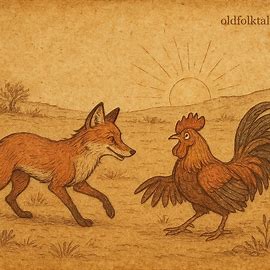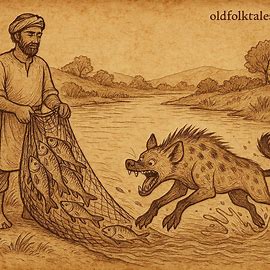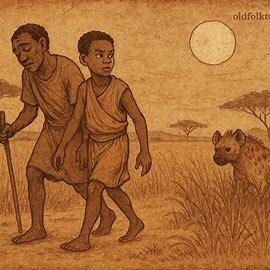In the old days, when animals walked the earth like neighbors and friends, there was Cock, proud yet trusting, and Fox, sly and restless. The two had grown close, often spending their days together in laughter and play. Each morning, Cock would leave his home and wander over to Fox’s dwelling, eager to pass the time in friendly company. Fox welcomed him warmly, as though their bond were one of loyalty and trust. Yet beneath Fox’s smooth words and watchful eyes, a darker intention stirred.
One particular day, as the two played together, Fox fixed his gaze on the curious crown atop Cock’s head, the fleshy red comb that swayed whenever he moved. With a sly grin, Fox asked, “My friend Cock, the thing that grows in the middle of thy head, if thou were to strike another with it in struggle, would it wound him?”
Cock tilted his head back and burst into laughter. “Ah, my friend Fox,” he replied, “how foolish thou art! These are but flesh. They do not wound.” He flapped his wings and chuckled again, amused that such a clever creature as Fox could think his comb dangerous.
Fox’s eyes narrowed as he nodded slowly. “Indeed? I always thought it a weapon, sharp and strong. Whenever I looked upon it, fear would seize me. I thought, ‘If my friend Cock should strike me with that thing, I shall surely be wounded.’ But now I see, it is nothing at all.”
Cock continued to laugh, proud of his strange crown yet blind to the cunning working in his companion’s mind. Soon after, the two parted ways for the evening. Cock returned to his roost, while Fox crept back into his hollow anthill.
The Fox Plots Against the Cock
Alone in his den, Fox lay awake, thinking. “All this time I have fled from him, fearing the comb on his head. I thought it a weapon that might harm me if ever we quarreled. But no, it is only soft flesh. Nothing more.” His lips curled into a wicked smile. “Now nothing restrains me. Tomorrow, I shall act.”
Fox closed his eyes and drifted into sleep, his mind filled with the image of a helpless Cock.
READ THIS: The Fox and the Mole: An Angolan Folktale of Pride and Humility
When morning came, Cock once again made his way to Fox’s dwelling, cheerful and unsuspecting. As always, he greeted his friend warmly, and together they began to play as they had so many times before. Cock strutted about, flapping his wings proudly, while Fox circled behind him, his eyes gleaming with hunger and deceit.
Suddenly, Fox lunged. He seized Cock by the neck with fierce jaws.
“Shame!” cried Cock in shock and betrayal. “How art thou handling me, thou my friend?” He struggled, wings beating, but Fox’s grip tightened.
Fox ignored his cries. With a brutal bite, he sank his teeth deeper into Cock’s neck. The struggle ended quickly, and Cock lay still—his trust repaid with treachery.
The Lesson of the Cock and the Fox
From that day onward, Fox no longer spared the lives of cocks. In the past, whenever he caught a fowl, he would take only hens, leaving the cocks alone. He had feared their crowns, believing them dangerous. But Cock himself had destroyed that fear when he laughed and said, “This thing kills not anything; it is flesh only.”
By trusting his friend with the truth, Cock armed Fox with the knowledge he needed to betray him. Thus ended the bond of false friendship between them.
“I have told my little tale,” the storyteller would say. “Finished.”
Moral Lesson
This Angolan folktale warns against blind trust in those who hide cunning beneath friendly words. Cock’s downfall came not from weakness of body but from misplaced faith in Fox’s friendship. By revealing his secret carelessly, he gave his enemy the weapon needed to destroy him.
The tale teaches us to be discerning in our friendships, to guard our vulnerabilities, and to remember that not all who smile at us wish us well. True friendship is proven by loyalty, not by flattery or deceit.
Knowledge Check
Who were the two main characters in the story?
The tale features Cock, the trusting bird, and Fox, the cunning predator.
What part of Cock’s body did Fox fear at first?
Fox feared the fleshy red comb on Cock’s head, believing it could wound him.
How did Cock reassure Fox about his comb?
Cock laughed and explained that it was only flesh and could not harm anyone.
What action did Fox take after learning the truth?
Fox attacked Cock, biting him by the neck and killing him.
What lesson does the story teach about friendship?
It warns against trusting deceitful companions and revealing one’s vulnerabilities carelessly.
What is the cultural origin of this folktale?
It belongs to Kimbundu oral tradition in Angola.
Source: Kimbundu folktale, Angola.






